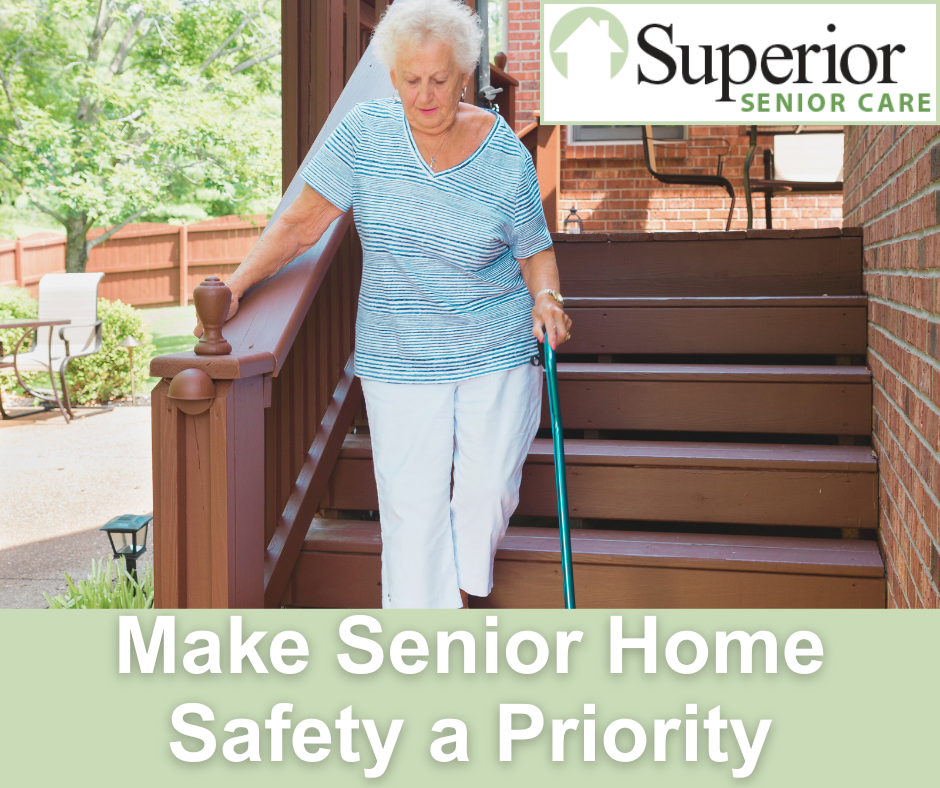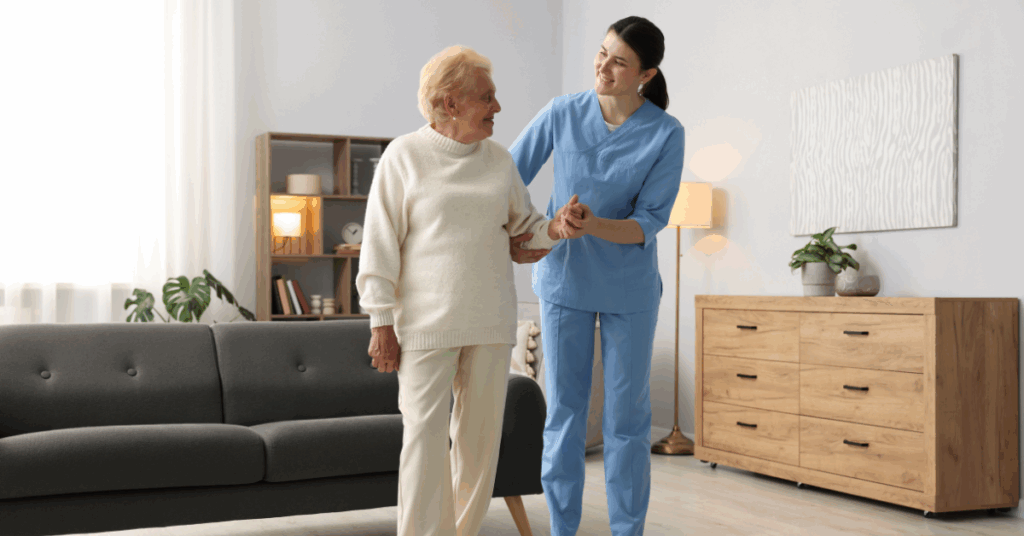
As we age, our homes should remain a sanctuary of comfort and safety. However, with the natural changes that come with aging, ensuring that our homes remain safe requires intentional effort. Senior home safety is not just about preventing accidents; it’s about enhancing the quality of life for our elder loved ones. This blog post explores essential strategies and practical tips to make senior home safety a priority.

Understanding the Common Risk Zones
Homes can become hazardous for seniors due to several factors, including mobility issues, poor vision, and cognitive changes. The most common risk zones include bathrooms, staircases, and kitchens. According to the CDC, one in four 65 and older Americans experience falls each year.
Practical Tips for Risk Zone Safety
- Bathroom Safety
- Install grab bars near the shower, toilet, and bathtub.
- Use a non-slip mat in the shower.
- Consider a shower chair for added stability.
- Staircase Safety
- Ensure handrails are sturdy and extend the full length of the stairs.
- Keep stairs well-lit and clear of clutter.
- Consider installing a stairlift for those with severe mobility issues.
- Kitchen Safety
- Keep frequently used items within easy reach to avoid climbing.
- Use appliances with automatic shut-off features.
- Ensure floors are dry to prevent slipping.

The Cost of a Fall
The Financial and Emotional Impact
Falls are the leading cause of fatal injury and the most common cause of nonfatal trauma-related hospital admissions among older adults. The financial cost of fall-related injuries can be substantial. Beyond the financial impact, falls can lead to a loss of independence and increased fear and anxiety. This emotional toll can affect not only the seniors but also their families and caregivers.

Fall Prevention
Strategies for Prevention
Preventing falls involves a combination of physical activity, home adjustments, and health care management. Exercise programs that focus on balance and strength, like tai chi, can significantly reduce the risk of falls. Encouraging regular participation in such activities can enhance physical stability and confidence.
Implementation Tips
- Education:
- Engage in community programs focusing on fall prevention to raise awareness and share effective strategies.
- Regular Check-ups:
- Encourage regular health screenings to identify risk factors that may contribute to falls, such as balance issues or medication side effects.
- Exercise Programs:
- Join local senior exercise classes or follow online video tutorials to improve strength and balance.
- Vision Checks:
- Regularly schedule eye exams to ensure vision is optimal, as poor vision can increase the risk of falls.
- Footwear:
- Wear supportive, non-slip shoes both inside and outside the home to maintain stability and prevent slips.
- Community Support:
- Utilize local resources like senior centers for information, exercise programs, and support, fostering a network that promotes safety and well-being.

Simple Home Modifications
Cost-effective Changes
Small changes can make a big difference in enhancing senior home safety. Home modifications do not always require major renovations and can often be done with minimal cost. These adjustments can significantly reduce the risk of accidents and make daily activities easier.
Practical Modifications
- Lighting:
- Improve lighting in dark areas; hallways and stairways, using LED bulbs or motion-sensor lights to enhance visibility.
- Furniture Arrangement:
- Ensure furniture is arranged to allow for safe movement, minimizing obstacles in pathways.
- Flooring:
- Remove loose rugs or secure them with non-slip pads to prevent tripping hazards.

Security
Protecting Against Intruders
Feeling safe at home goes beyond physical safety; it includes protection from intruders. Seniors can be particularly vulnerable to scams and break-ins.
Enhancing Security
- Locks and Alarms:
- Install deadbolts and consider a security alarm system to deter intruders and provide peace of mind.
- Community Watch:
- Participate in neighborhood watch programs to foster a sense of community and collective vigilance.
- Visitor Verification:
- Always verify the identity of visitors, especially unexpected ones, to prevent scams and unauthorized access.

Safety
General Safety Measures
In addition to fall prevention and security, general safety measures are crucial for senior home safety. This includes being prepared for emergencies like fires or medical crises, ensuring seniors can respond effectively in such situations.
Implementing Safety Measures
- Smoke Detectors:
- Install and regularly check smoke and carbon monoxide detectors to ensure they are functioning correctly.
- Emergency Contacts:
- Keep a list of emergency contacts easily accessible in case of urgent situations.
- First Aid Kit:
- Ensure a fully stocked first aid kit is available to address minor injuries promptly.

Conclusion
Making senior home safety a priority demands a comprehensive approach that encompasses understanding risk zones, fall prevention strategies, home modifications, and enhanced security measures. By adopting these practical solutions, we can help ensure that our senior loved ones continue to enjoy a comfortable and secure living environment.
In-home senior caregivers play a vital role in this endeavor, providing personalized support and resources to address the unique needs of each individual. By working together with caregivers, family members, and community resources, we can build a network that prioritizes the safety and well-being of our elderly loved ones, allowing them to age gracefully and securely in the comfort of their own homes.
Are you looking for an In-Home Caregiver ?
Superior Senior Care is Arkansas’s oldest, most trusted name in in-home care services. We prioritize your peace of mind. We offer referrals for a variety of levels of elderly care and services, with both short and long-term options. All the senior caregivers on our registry undergo thorough screenings and comprehensive background checks. And they are trained to work with clients in everything from household duties to grocery shopping. We’ve helped families with a variety of chronic conditions including dementia, Alzheimer’s disease, arthritis, Parkinson’s disease, lung disease and more.
As the first accredited registry in Arkansas, we have more than 35 years of experience and thousands of happy customers. Access to our large client registry means stability for you and the best chance to match you with just the right family.

Home Health Services
For more information on our home health services offerings, please contact us today.

Caregiver Registry
Interested in becoming a caregiver on our registry? Fill out and electronically submit our pre-screening referral application.

